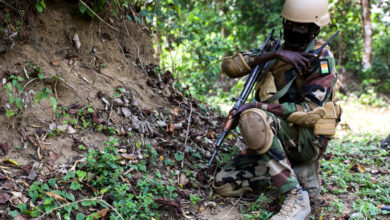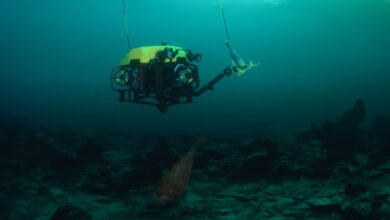France expects a new international special operations task force to deploy in Mali by 2020, Armed Forces Minister Florence Parly said on Tuesday, November 5.
Efforts to boost the European security presence in the region come amid protests against international forces in Mali and neighboring Niger, and ongoing questions over the ability of Sahelien militaries to counter insurgency in the region.
During a visit to the large French base in the northern Mali city of Gao on a trip that also included meetings in Chad and Burkina Faso, Parly acknowledged the security situation was “clearly difficult” but said France was nearing a breakthrough in talks.
“By 2020, special forces from European countries will be deployed in Mali alongside French special forces to pass on exceptional know-how” to Mali’s army, Parly said.
She added that around a dozen countries had been approached to join the unit – to be named “Takuba,” which means “sabre” in the Tuareg language.
France, whose 4,500-strong Operation Barkhane force has been in the region since 2014, has been trying to convince European partners to boost military assistance to the Sahel. The French plans for a Combined Joint Special Operations Task Force for the Sahel were first reported in early October.
Parly said she was “optimistic” and that she had received encouraging replies, but noted that participation is conditional on votes in national parliaments.
Mali’s army has been struggling to contain the Islamist insurgency despite help from its African neighbors, France, and the United Nations.
Many armed groups are active in Mali and the wider Sahel region, including Islamic State-affiliated groups. Since May, ISIS has attributed insurgent activities in the Mali-Burkina Faso-Niger tri-border area to its West Africa Province affiliate, rather than to what was previously known as Islamic State in the Greater Sahara.
Islamic State claimed two attacks in Mali over the weekend, saying ISWAP fighters were responsible for an attack on a military base in Indelimane that killed at least 49 people on Friday, and for a roadside bomb blast that killed a French soldier between Gao and Menaka on Saturday. ISIS said that attack was also in the Indelimane area.
MINUSMA, the U.N. peacekeeping mission in Mali, helped the army build the Indelimane base last year, along with French soldiers.
The majority of attacks in the Sahel are attributed to JNIM, which formed in March 2017 from a merger of several smaller groups including the Sahara branch of al-Qaeda in the Islamic Maghreb, Ansar Dine and Al-Mourabitoun. JNIM’s leadership has pledged allegiance to al-Qaeda leader Ayman al-Zawahiri.
JNIM regularly reinforces its opposition to “occupier” France, and in September warned the governments of the G5 Sahel group of states that attacks against their forces would continue while they support the Barkhane force.
That threat was underscored in late September, when at least 40 Malian soldiers were killed in simultaneous raids claimed by JNIM in Boulkessi and Mondoro, near central Mali’s border with Burkina Faso, one of the deadliest attacks against Mali’s military in recent insurgent violence. The troops were from a battalion under G5 Sahel Joint Force command.
Parly later said Ali Maychou, a senior figure in the al-Qaeda-linked Group to Support Islam and Muslims (JNIM), had been killed in Mali in early October.

International operations in the Sahel
In 2012 a Tuareg separatist uprising against the state was exploited by Islamist extremists linked to al-Qaeda who took key cities in Mali’s desert north.
France began its Operation Serval military intervention in its former colony early the next year, driving the jihadists from the towns, and the MINUSMA peacekeeping force was then established.
But the militant groups have morphed into more nimble formations operating in rural areas, and the insurgency has gradually spread to central and southern regions of Mali and across the borders into neighboring Burkina Faso and Niger. Large swathes of Mali remain outside government control, and inter-ethnic bloodshed is a regular occurrence.
The Serval mission evolved in August 2014 into Operation Barkhane, which has a mandate for counter-terrorism missions across the Sahel. Roughly 4,500 French troops are deployed in the region, including around 2,700 soldiers in Mali. Force protection personnel from Estonia and Chinook helicopters from the United Kingdom currently support the Barkhane force, and Denmark is to send two helicopters and up to 70 troops in December.
Barkhane focuses activity in insurgent-hit Mali, Niger and Burkina Faso, and troops work alongside other international operations, including the roughly 14,000-strong MINUSMA United Nations stabilization mission in Mali, and the G5 Sahel Joint Force, the long-planned 4,500-strong joint counter-terrorism force comprising troops from Burkina Faso, Chad, Mali, Niger and Mauritania.
The European Union funds a Training Mission in Mali, which has a mandate until May 2020. Troops from 22 member states and five non-E.U. states work with both the Malian Armed Forces (FAMa) and the G5 Sahel Joint Force. It has trained around 13,000 FAMa personnel.
U.S. officials said in August that the U.S. will seek additional contributions from the Global Coalition Against ISIS to combat the group and its affiliates in Africa. At the request of France, members of the U.S.-led Coalition will meet in Washington on November 14.
US begins ISR flight operations from Air Base 201 in northern Niger
With reporting from AFP











